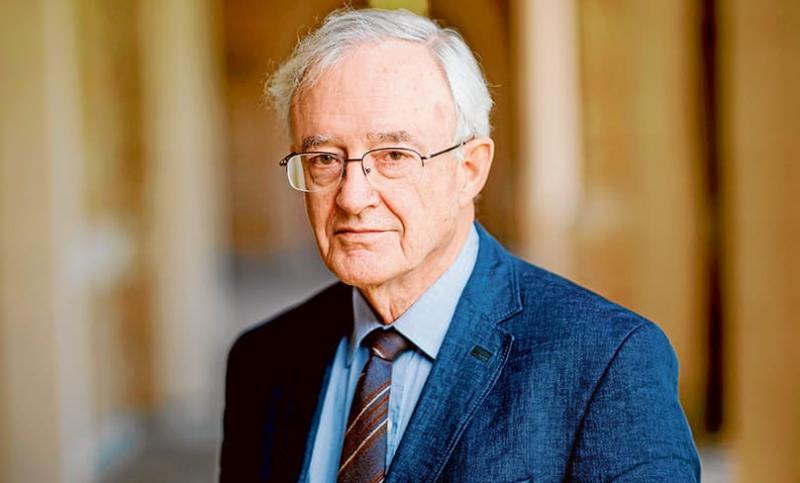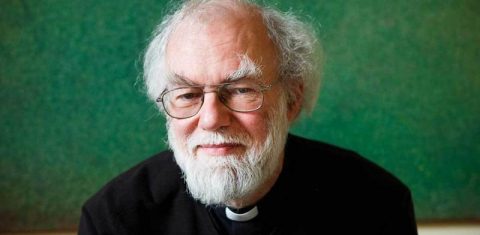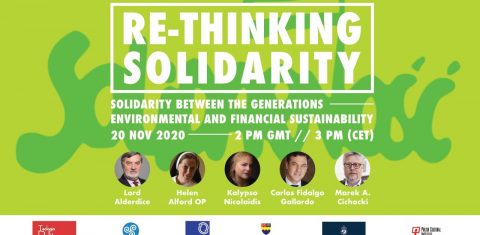The goods and harms intrinsic to persons and their associations only begin in this life, and simply cannot be weighed against one another […] by using one’s reason while making no use of moral standards in the process of assessing. Human providence and assessment can never soundly conclude that the choice to kill an innocent person […] will result in less harm overall, and in the long run, than the choice to refrain – said Prof. John Finns in one of the series of ‘JP II Lectures’, organized by the St John Paul II Institute of Culture in Rome’s Angelicum.
Listeners were welcomed by Fr Dominic Holtz OP – Vice Dean of the Faculty of Philosophy at the Pontifical University of St Thomas Aquinas in Rome – the Angelicum. Fr Holtz thanked those people without whom this event, or indeed the entire cycle, could not have taken place: Fr Michał Paluch OP, Rector of the Angelicum, Fr Serge-Thomas Bonino OP – Dean of the Faculty of Philosophy and Fr Ryszard Rybka OP – Director of the St John Paul II Institute of Culture in Rome. He paid special thanks to the St Nicholas Foundation and the Chairman, Dariusz Karłowicz, present at the meeting, and to the Futura Iuventa Foundation, who together brought the St John Paul II Institute of Culture to life.
The Chairman of the St Nicholas Foundation, Dariusz Karłowicz spoke next, presenting a brief introduction to the main speaker. Prof. John Mitchell Finnis was born in 1940 in South Australia. A lawyer and philosopher, he lectured at Oxford University in the years 1965-2010, where he is currently Professor emeritus of Law and Legal Philosophy. He also lectured at the University of Notre Dame in Indiana in the years 1995-2020 as a Professor. He is the author of: Natural Law and Natural Rights (1980; 2011); Fundamentals of Ethics (1983); Moral Absolutes (1991); Aquinas: Moral, Political and Legal Theory (1995); and five volumes of Collected Essays (2011). Between 1986-1991, he was a member of the International Theological Commission; a consultant of the Pontifical Council Iustitia et Pax in 1978-89, and a member in 1990-1995; and an ordinary member of the Pontifical Academy for Life in the years 2001-2016.
Following introductory statements, Prof. John Finnis began his discussion focussing on three of Pope John Paul II’s encyclicals which, according to Prof. Finnis, set forth a conception of the foundations of ethics: Redemptor hominis, Laborem exercens, and Veritatis splendor, as well as several other statements from the period of his papacy. They serve to illustrate one of the most important propositions of Christian teaching, namely that some important elements of Christian teaching restate and make more widely available the equivalent teachings of sound philosophy – an example here may be the area of normativity, that the principles and precepts originating from philosophy correspond to the law set forth in the decalogue and presented by St Paul in his Letter to the Romans. Following the tradition of St Thomas Aquinas, we may conclude that the principles of the Decalogue are overwhelmingly natural in character, that is they are universally accessible to human reason, unaided by Revelation.
As Prof. Finnis further explained, John Paul II’s reflections from his pre-papal period were founded on the principle that, to understand human nature, before we attempt a metaphysical or philosophical analysis, we must first consider its ethical aspect. In discussing the encyclical Laborem exercens, Prof. Finnis at the outset explains its meaning. The guiding thread is the mystery of creation – “For by work, human persons fulfil, develop or realize themselves: that is, we each share in God’s creation of us, even when the work – what we are working on, or working at – is humble in its ‘objective character’ as work”.
Work is understood in the encyclical in two ways. Firstly, it has an objective sense – it refers to external reality – it may consist, for example, in the processing of some natural resources by means of tools, resulting in the development of a new product. An essential feature of objective work is the opportunity to observe the activity as a phenomenon in time and space. However, this work, having its origin in the entity, is directed at external reality. Interestingly, Prof. Finnis, while stressing that this externality concerns will, also includes prayer or contemplation in the category indicated – although it can only be observed by the person praying or contemplating.
Therefore, the objective aspect of work – according to Laborem exercens – is the realization of God’s command for Man to subdue and dominate the Earth. According to the message of the encyclical, work has a deeply ethical aspect, constituting a tangible manifestation of the self-establishment of a free man. As Prof. Finnis points out, similar reflections were found in the encyclical Gaudium et spes and later found expression in Wojtyła’s The Acting Person.
These considerations encapsulate John Paul II’s key teaching about the transcendence of a person. It supposes the possibility, as a result of free will, of structurally crossing one’s own boundaries. Free choice constitutes the phenomenon that we call identity.
Another important issue mentioned by Prof. Finnis, present in both The Acting Person and Laborem exercens is the characteristic permanence of human acts carried out within this freedom – they live in a person thanks to the moral values they represent. As Prof. Finnis points out, work also has a subjective aspect, revealing itself in the thought of a person over his deed, and thereby making himself also a certain object. This is closely linked to the message of the encyclical, which states that the purpose of every work is always ultimately Man.
Free choice constitutes the phenomenon that we call identity.
In the next part of the speech Prof. Finnis began to analyse Redemptor hominis, John Paul II’s first encyclical. According to his interpretation, this document presents intellect and will as essential elements in self-determining choices and actions. It follows that conscience is understood as a kind of understanding of the proposals for action. Understanding these issues is, according to Prof. Finnis, impossible without putting oneself in the place of the person making the choice, that is the ‘internal point of view’, which is essential for understanding Veritatis splendor.
Turning to the encyclical Veritatis splendor, Prof. Finnis points out that, while being primarily doctrinal, magisterial, and apostolic, it is at the same time a theological work and seeks to be sound philosophy. Prof. Finnis believes that a resort to the thought of Max Scheler was of little help. One of the key chapters is an analysis of the four currents of thought converging on dissent from the church’s constant moral teaching. John Paul II confronts many of these accusations, regarding, among other things the communion of marriage, the definition of conscience, and the status of truth.
Prof. Finnis then addresses the current known as ‘proportionalism’, which is most carefully identified and discussed in the encyclical, and points out that “… according to that line of thought, a particular action cannot be judged, or assessed in conscience, to be, in the circumstances, wrong, until one has weighed all the particular acting person’s motivations and circumstances, including the likely, over-all long-term consequences. And then its wrongness is simply disproportionate harmfulness or likely harmfulness relative to the morally relevant ‘values’ or human goods.” Without such an individualized assessment of proportionality, no general precept or ‘commandment’ can truly be more than a reminder of important values and ideals or orientations for considering what love of God and neighbour calls for in the situation in which the choice whether or not to engage in a particular act (of non-marital sex, abortion, or euthanasia, etc.) is to be assessed. That assessment, to repeat, is to be made, said these theologians, in the light of the proportions of good and bad, value and disvalue, foreseeable in the likely over-all, long-term, or medium-term outcomes of the alternatives – of engaging or alternatively not engaging in that act in that kind of situation.
Most importantly, according to John Paul II, the morality of behaviour is assessed only by the actions on which the subject had the opportunity to choose freely. He also points out that the very essence of the act is important – not just the accompanying intention, the purpose or the circumstance. In addition, he distinguishes a category of intrinsically evil actions – irrespective of the prevailing variables.
In the final part of his address, Prof. Finnis points out that: “The goods and harms which are intrinsic to persons and their associations only begin in this life, and simply cannot be weighed against one another in the way the proportionalists proposed, that is, by using one’s reason but making no use of moral standards in the process of assessing. Human providence and assessment can never soundly conclude that a choice to kill an innocent person or to engage in adultery will result in less harm overall and in the long run than the choice to refrain.”
According to John Paul II, the morality of behaviour is assessed only by the actions on which the subject had the opportunity to choose freely.
As indicated by Prof. Finnis at the end of his lecture, acts regarded as intrinsically evil have a twofold effect. They do not merely produce changes in the state of affairs outside the will of the acting person: the choice’s transitive effects. One is also making a decision about oneself, thus creating an intransitive effect, constituting oneself as the sort of person who does such things.
The last part of the event was an opportunity for the audience to speak. Among other things, the audience was interested in the possibility of dialogue between natural law and contemporary ideological currents, how Christian ethics responds to the conclusions of modern empiricist science, and whether there is a platform for Christian-scientific dialogue in the field of ethics. There was also a question about the topicality of the encyclical Veritatis splendor and the ontological status of natural law.
Summary: Hanna Nowak
Full text of the lecture can be found here.




